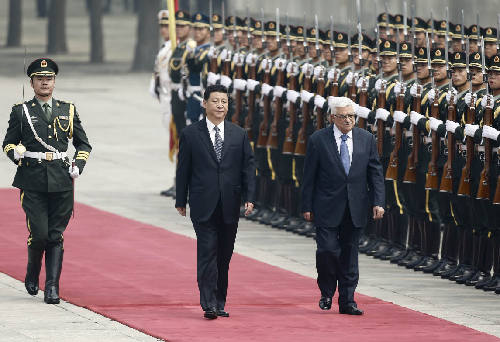Contribute Positive Energy to the Middle East Peace Process
By WU SIKE
|
 |
| Chinese President Xi Jinping and President Mahmoud Abbas in front of the Great Hall of the People on May 6, 2013. |
AT the invitation of the Chinese government, Palesti-nian President Mahmoud Abbas and Israeli Prime Minister Benjamin Netanyahu each made official visits to China between May 5 and 10. Having visited both Palestine and Israel in late April, in my capacity as China’s special envoy to the Middle East issue, I was also present at Chinese leaders’ meetings with Abbas and Netanyahu.
Stance of the New Leadership
China’s new generation of leaders extended invitations to the Palestinian and Israeli leaders shortly after assuming office, so signifying the importance they lay on the Middle East situation.
The Palestinian problem is a world hotspot that remains unresolved after more than half a century. Rather than avoiding it or taking a detour, about two months after assuming office the new generation of Chinese leaders confronted this complicated issue. This shows that China, in line with its responsibilities as a permanent member of the UN Security Council and a world power, is ready to participate in resolving international conflicts. This stance is evident in China’s support for negotiated settlements of the Palestinian matter and its concern over the extended deadlock in the peace process. China advocates resumption of Israeli-Palestinian peace talks, and encourages both sides to take practical action towards creating an atmosphere favorable to resumption of peace talks. As Chinese President Xi Jinping said in his meeting with Abbas, both parties should follow the trend of the times and adhere to the path of peace talks through compromise and mutual understanding.
These meetings also signify China’s self-confidence in diplomatic dealings. After years of development, China has vastly improved its national strength as well as international status and influence. China, moreover, has a distinct advantage in having maintained good bilateral relationships with both Palestine and Israel. It thus constitutes a driving force towards finding a solution.
During his meeting with President Abbas, President Xi raised four proposals on settlement of the Palestinian issue. Their aim was to encourage both parties to advance the peace process through negotiation and compromise. The proposals explicate a direction that adheres to the principles of Palestine independence and peaceful coexistence between Palestine and Israel while respecting Israel’s right to existence and security. They also make clear that negotiation is the sole way of achieving peace. The proposals define the primary principles to be adhered to and which the international community accepts, such as “land for peace.” They call for a strengthened sense of responsibility and urgency from the international community through provision of guarantees that advance the peace process. The proposals embody China’s long-term stance and incorporate new factors resulting from changes in the Middle East. They reflect China’s hope that the Middle East peace process will be resumed without delay and that peace will prevail. The war-torn Middle East, meanwhile, remains in turmoil, even though peace, stability and development are the common expectations of countries in the region. It is hence in all parties’ interests to resolve the dispute through political means.
Abbas was the first Middle East leader that the new Chinese government invited to visit after taking office. The invitation highlights the importance Chinese leaders lay on the Middle East issue, and their consistent position on supporting Palestine.
During his maiden trip abroad, President Xi visited three African countries as well as Russia. This implies the importance China places on the continent that is home to such a large number of developing countries. WANA (West Asia and North Africa) encompasses many such countries that have unequivocably supported China on core issues. They constitute a force that China can trust and rely on. In the new historical era, consolidating and developing our relationship with these countries requires careful planning and proactive promotion. As Xi pointed out, Palestine has long been at the core of Middle East issues and hence wields global impact. Inviting Abbas to visit represented a key link in China’s comprehensive diplomatic layout and the maturity of its relationship with the Arab world.
Pushing forward development of the bilateral relationship, especially cooperation in economy, trade, science and technology, constitutes the main result of the visits. Since the 18th CPC National Congress, promoting sustainable development and rejuvenation of the Chinese nation have been the long-term goals of the new generation of leaders and the entire Chinese people.
The “Chinese Dream” will come true not behind closed doors, but through a more open approach. We should therefore promote international exchanges and cooperation in efforts to achieve mutual benefits for China and the world. Discussions on how to improve cooperation in economy, science and technology were key features of the visits of both the Palestinian and Israeli leaders. At this special historical stage, Palestine hopes that more Chinese companies and factories will explore and invest in the West Bank. Discussions with the Israeli prime minister included development and cooperation in broader areas.
The new generation of Chinese leaders is bent on promoting practical bilateral cooperation and broadening communication and exchanges. Promoting such bilateral cooperation with Palestine and Israel were consequently predominant aspects of the respective visits. China and Palestine signed agreements on strengthening cooperation in economy, trade, culture and education. They also discussed ways of encouraging Chinese companies to invest in the West Bank and utilize its resources. Palestine expressed willingness to take measures towards achieving mutual benefit and enriching the friendship between China and Palestine.
Since the establishment of diplomatic relations between China and Israel more than 20 years ago, their rapport has grown considerably. On this occasion both parties, in the spirit of equality, mutual trust and learning, tolerance, cooperation and win-win, held in-depth discussions on how to complement one another and deepen practical cooperation in science and technology, water conservation and clean energy. Both also agreed to establish a special coordination organization.

